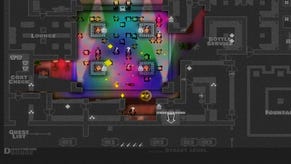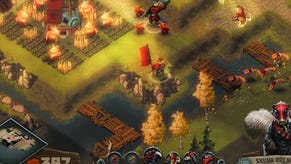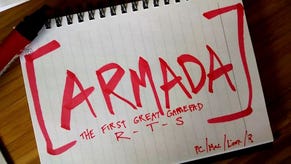Monaco: Monaco! Monaco! Monaco!
There are certain games which, when their names are uttered three times into a mirror, cause Peter Molyneux to appear. Following serious testing, we can confirm that Monaco is not one of them. And that's not all we know about Monaco, the game by Pocketwatch Games, aka Andy Schatz. We – all five – gentleman thieves of RPS recently played the IGF-winning four-player steal 'em up (John and I had to sit out by turns) in an special group contrivance. It was a fun time, a giddy time, like the south of France on a balmy night. Monaco!
This was the recent PAX build of the still as-yet-unreleased game, with four entire levels, and – for some reason - there's actually a video of us tackling one of them posted below. I've also penned some thoughts about the experience, which I previously looted from my brain, and those of my fellow conspirators.
Monaco is a top-down, multiplayer heist game. Set across a series of multi-part levels (usually the different floors of a building) the idea is to get in, grab the loot, and get out again. The open-endedness of the levels means that this could potentially be a mad smash and grab (which was how we played it, in our inexperience) but could also be something far more subtle. It reminded us, in that way, of the Hitman games, where there could be a number of ways to complete each heist, if only we had taken the time to find it.
Everybody gets to choose from a number of character, each with one innate ability and one which is unlocked when he's managed to loot five diamonds from the level. The Muscle, for example, is incredibly tough, and can take being shot repeatedly by guards, but when he has the five diamonds he also gets some C4, which can be used to blast through walls. The embarrassingly-named Prowler gets a limited “radar” to peek through walls, and if he gets his diamonds he gains a smoke bomb. They all follow this kind of pattern, unlocking abilities to knock out guards and guard dogs, and so on. All the characters can pull a wounded character to his feet, but death occurs after about a minute if they are allowed to stay stricken.
The need to collect diamonds lead to a group competition between us to unlock our abilities, of course, but I suspect with some practice it will be possible to know which powers are needed and when. For example, breaching a wall to get into a building might get you access to a shortcut, and remove substantial security-scamming problems, but you'll need to get it right. Screw up by placing the bomb on the other side of a well-guarded room and the alarms will go off, and the armed marksmen will come running.

The presentation of Monaco has leapt forward since I first saw it, both in terms of general graphics – which have followed the the bright, abstract blockiness of the original idea, but amplified it to new levels of indie charmingness - but also in how some of the fundamentals appear on screen. The most obvious of these is the view-cones, which sweep around the level like searchlights, clearing away the dark spaces as you characters get line of sight across the level, and then letting them disappear into the fog of war burglary. This includes peering in through windows, which led to a beautiful moment where we were stacked up, watching a guard through a window, and noting that he'd moved an alerted state. “Wait, how can he see us in here, it's like we're looking.... through... transparent...” Yes. The slow cogs of the RPS intellect clicked into place.
And I think that slow-clunk-to-comprehension was true of the game as a whole. Since we were playing a demo build for a game convention, and had no developer leaning over us to explain things, there was a cascade of trial and error, but it was nevertheless riotous fun. The top down scale and the fiddliness of the maps is initially baffling, but this bafflement does not and will not last long. We were horribly murdered by the guards (who yell in French as they get excited by your interloping) the first time out, but that was okay, because it began to reveal that this is one of those games that has a broad scope of possible solutions. Hiding in bushes, creating diversions, hacking security cameras, chloroforming guards, hiding in the toilet, running for your life. On the one hand it feels a bit like Commandos, with the prescribed roles for the various characters, but on the other it felt fluid and flexible, because its rules and tools deliver scope for experimentation and improvisation: emergent situations will abound.
The lowdown is this: Monaco totally deserved its IGF win. It is pacey, thrilling, and has that sense of precarious crisis-horror that games which are about sneaky and surviving, rather than shooting, do so well. While Schatz has talked in interviews about how he enjoys playing the game alone with his fiancee, whether or not it will hold up for the lone player isn't clear – while you could play alone if you wanted, you'd be working at a hugely reduced effectiveness, though I am sure it's beatable by ninja determination. But that's almost irrelevant: this is an exciting, vibrant game, and one of those inspired designs that also evidence the sheer hard work that has been poured into into it. Nice work, Mr Schatz. We look forward to the full release. Not aware of a date for that, but soon, hopefully.
Similar production values to the podcast:

















